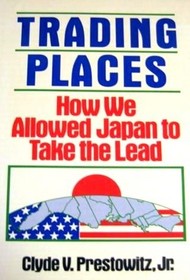Susan W. (Suz) reviewed Trading Places: How We Allowed Japan to Take the Lead on + 725 more book reviews
From the dust jacket: "The story has become depressingly familiar-and predictable. In industry after industry, whether it is semiconductors or machine tools or automobiles, the United States has ceded first place to Japan. Clyde Prestowitz has observed this process firsthand-as a senior executive living in Japan and competing for market share, as a leading trade negotiator in the Reagan administration, and as a lifelong student of Japanese culture.
In this important, eye-opening new hbook, he provides us with a unique inside look at precisely how the Japanese have done what they've done and how, wittingly and unwittingly, we have helped them. He shows how Japan, a densely populated, culturally homogeneous nation, where business works with government (and vice versa), where markets are organized around a myriad of formal and informal understandings, and where national goals dominate over individual competitive advantage, simply cannot open up its markets to American business. With a wealth of fascinating examples drawn from intimate discussions with both U.S. and Japanese businessmen and from his own participation in frustrating negotiations, Prestowitz explains why our response to the challenge has been so dismal and spells out what needs to be done-in rethinkging corporate strategies, in improving the quality of our economic diplomats, and above all, in abandoning cherished illusions about the way the world works-if we are to regain our competitive edge."
In this important, eye-opening new hbook, he provides us with a unique inside look at precisely how the Japanese have done what they've done and how, wittingly and unwittingly, we have helped them. He shows how Japan, a densely populated, culturally homogeneous nation, where business works with government (and vice versa), where markets are organized around a myriad of formal and informal understandings, and where national goals dominate over individual competitive advantage, simply cannot open up its markets to American business. With a wealth of fascinating examples drawn from intimate discussions with both U.S. and Japanese businessmen and from his own participation in frustrating negotiations, Prestowitz explains why our response to the challenge has been so dismal and spells out what needs to be done-in rethinkging corporate strategies, in improving the quality of our economic diplomats, and above all, in abandoning cherished illusions about the way the world works-if we are to regain our competitive edge."




